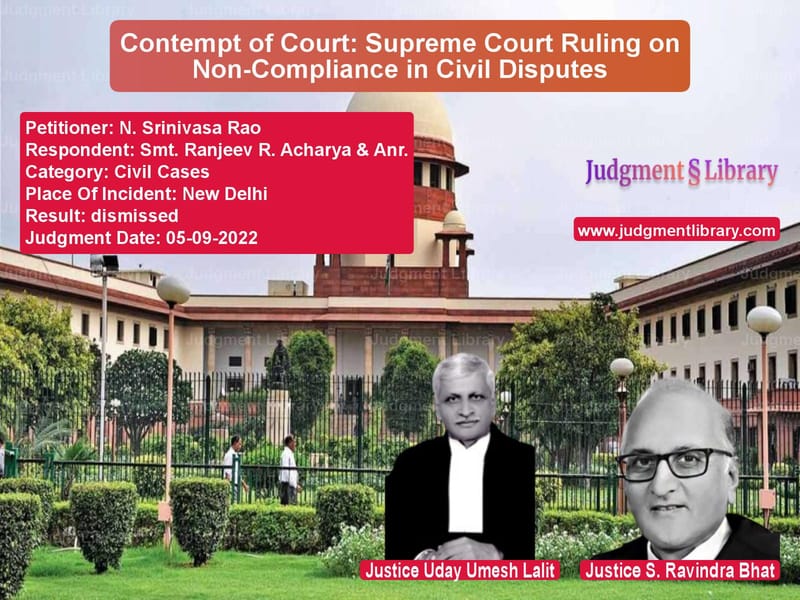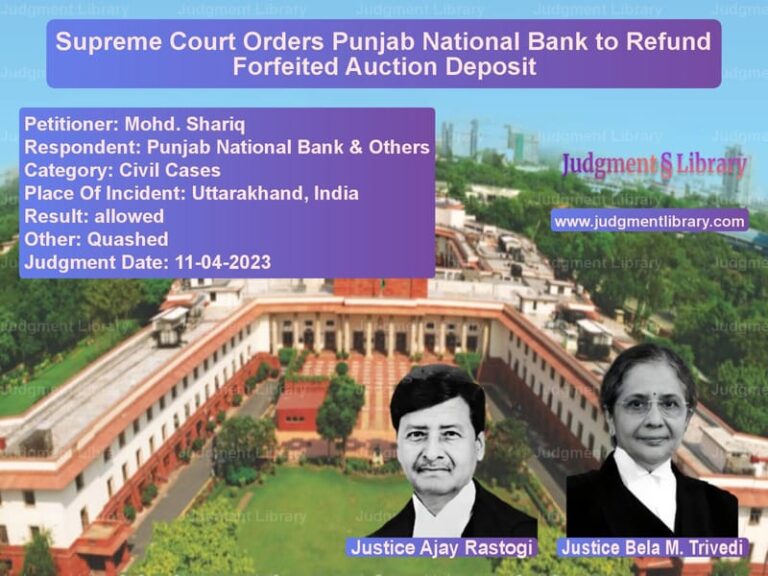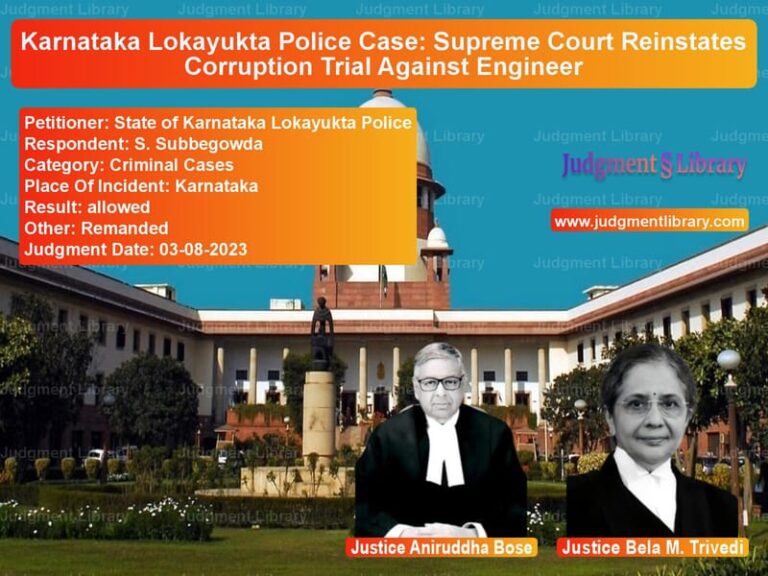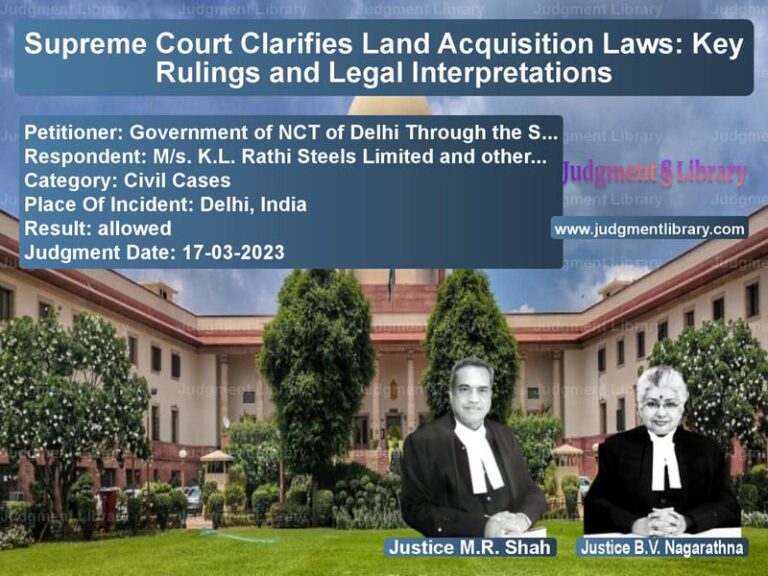Contempt of Court: Supreme Court Ruling on Non-Compliance in Civil Disputes
The case at hand involves contempt petitions filed by N. Srinivasa Rao and Govindraj & Ors. against Smt. Ranjeev R. Acharya & Anr. for non-compliance with the directions given in previous civil appeals. These contempt petitions were filed after the respondents allegedly failed to comply with the Supreme Court’s previous orders in relation to the civil disputes. The Court heard the matter and, after considering the submissions, issued its judgment on September 5, 2022.
The contempt petitions arose from Civil Appeals No. 2711 of 2010, 2712-2713 of 2010, in which the appellants had previously sought relief from the Court. However, the respondents were accused of not abiding by the directions provided in those cases, prompting the petitioners to file contempt petitions seeking enforcement of the Court’s orders. The case raises important questions regarding the implementation of Supreme Court orders and the consequences of failing to comply with judicial directions.
Background of the Case
In earlier civil proceedings, the petitioners, N. Srinivasa Rao and Govindraj, had filed appeals against the respondents, Smt. Ranjeev R. Acharya and others, seeking a resolution to certain disputes. The Supreme Court, after considering the appeals, issued its judgment in favor of the petitioners, with specific directions for the respondents to comply with certain obligations arising out of the case.
Read also: https://judgmentlibrary.com/property-dispute-and-criminal-charges-supreme-court-clears-accused/
However, the petitioners alleged that the respondents had failed to comply with these directions. This led to the filing of contempt petitions in 2017, under the provisions of the Contempt of Courts Act, 1971. The contempt petitions sought to hold the respondents accountable for their non-compliance and to ensure that the earlier orders of the Supreme Court were enforced. The petitioners requested the Court to take appropriate action to compel the respondents to comply with its previous orders.
Petitioner’s Arguments
Ms. Anjani Aiyagari, learned counsel for the petitioners, argued that the respondents had wilfully disregarded the directions issued by the Court in the earlier civil appeals. She emphasized that the failure to comply with the Court’s orders had caused significant harm to the petitioners, who had been waiting for the implementation of the Court’s directives.
Ms. Aiyagari submitted that the respondents’ actions amounted to contempt of court, as they had been fully aware of the Court’s orders and had intentionally chosen not to comply with them. She requested the Court to take stern action against the respondents and ensure that the orders were implemented without further delay.
Respondent’s Arguments
Mr. P.V. Reddy, learned counsel for the respondents, contended that there was no intentional or willful disobedience of the Court’s orders. He argued that any delay or failure to comply with the orders was due to circumstances beyond the control of the respondents, and they had made genuine efforts to comply with the directions given in the earlier civil appeals.
Read also: https://judgmentlibrary.com/supreme-court-denies-transfer-of-civil-case-orders-expedited-trial/
Mr. Reddy further argued that the contempt petitions were not maintainable, as the respondents had taken steps to address the concerns raised by the petitioners. He suggested that there was no need for the Court to take action in this matter, as the respondents were willing to cooperate and resolve any outstanding issues.
Court’s Reasoning
The Supreme Court carefully considered the arguments put forth by both the petitioners and the respondents. The Court acknowledged the importance of ensuring that its orders were complied with and noted that non-compliance with judicial directions could not be condoned lightly. However, the Court also considered the nature of the alleged non-compliance and the reasons provided by the respondents for any delays.
The Court examined the facts of the case and found that, in this instance, there was insufficient evidence to suggest that the respondents had willfully failed to comply with the Court’s orders. The Court also took into account the fact that the respondents had made efforts to resolve the matter and had shown a willingness to comply with the directions given in the earlier judgments.
As a result, the Court determined that there was no need to proceed with the contempt petitions and discharged the notice issued to the respondents. The Court concluded that the respondents had not committed contempt of court, and as such, the petitions were not maintainable.
Judgment
The Supreme Court ruled that the contempt petitions filed by the petitioners were not maintainable and consequently discharged the notice issued to the respondents. The Court concluded that the allegations of non-compliance were not substantiated enough to warrant the continuation of the contempt proceedings. The Court’s order emphasized the importance of balancing the enforcement of judicial orders with the recognition of the efforts made by parties to comply with such orders.
The judgment made it clear that the Court would not entertain contempt petitions without sufficient evidence of willful disobedience of its directions. The Court’s decision reinforced the principle that contempt proceedings should only be pursued when there is clear and incontrovertible evidence of a party’s defiance of judicial orders.
Conclusion
The judgment in this case serves as a reminder of the importance of upholding the authority of the judiciary while also ensuring that contempt petitions are filed in good faith and are supported by concrete evidence. The Court’s decision to discharge the contempt petitions reflects its commitment to maintaining a fair and balanced approach to legal proceedings, ensuring that parties are not unduly punished without sufficient grounds for their actions. The ruling also highlights the role of the Court in resolving disputes efficiently and ensuring that its orders are respected without the need for excessive enforcement measures.
Petitioner Name: N. Srinivasa Rao.Respondent Name: Smt. Ranjeev R. Acharya & Anr..Judgment By: Justice Uday Umesh Lalit, Justice S. Ravindra Bhat.Place Of Incident: New Delhi.Judgment Date: 05-09-2022.
Don’t miss out on the full details! Download the complete judgment in PDF format below and gain valuable insights instantly!
Download Judgment: n.-srinivasa-rao-vs-smt.-ranjeev-r.-acha-supreme-court-of-india-judgment-dated-05-09-2022.pdf
Directly Download Judgment: Directly download this Judgment
See all petitions in Contract Disputes
See all petitions in Property Disputes
See all petitions in Damages and Compensation
See all petitions in Environmental Cases
See all petitions in Legal Malpractice
See all petitions in Judgment by Uday Umesh Lalit
See all petitions in Judgment by S Ravindra Bhat
See all petitions in dismissed
See all petitions in supreme court of India judgments September 2022
See all petitions in 2022 judgments
See all posts in Civil Cases Category
See all allowed petitions in Civil Cases Category
See all Dismissed petitions in Civil Cases Category
See all partially allowed petitions in Civil Cases Category







